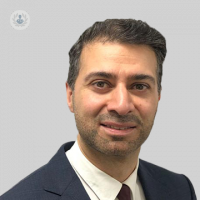Musculoskeletal disorders: what are the different types?
Escrito por:Musculoskeletal disorders are injuries and pain disorders that can affect the body’s musculoskeletal system (the muscles, tendons, ligaments, nerves and discs) which are required to support the body and help movement. There are many different causes of the disorders, which could range from a ligament sprain, gout to carpal tunnel syndrome. Here, one of our expert rheumatologists Dr Syed Asad Hussain explains everything that you need to know about the different types and how they are treated.

What parts of the body can musculoskeletal disorders affect?
The musculoskeletal system can be affected in many ways depending on the underlying causes, for example, rheumatoid arthritis is an inflammatory condition that mainly affects the hands and feet. Osteoarthritis can affect mainly the weight-bearing joints such as the lower back, hips and knees. Gout tends to affect single joints such as the big toe for various reasons. Connective-tissue diseases such as lupus can affect many joints including the hands. Although these are overall patterns joints can be affected in any pattern or way by these various conditions.
What are the commonest types of musculoskeletal disorders?
The most common causes of musculoskeletal disorders are osteoarthritis, gout, tendon problems such as tennis elbow and golfers elbow, carpal tunnel syndrome. The less common ones are inflammatory joint diseases such as rheumatoid arthritis and polymyalgia rheumatica. Although less common, these conditions are found within the populations in large numbers.
What are the general signs and symptoms of a musculoskeletal disorder?
Pain, swelling, inflammation and deformity can, unfortunately, result from conditions such as rheumatoid arthritis. Osteoarthritis is a long-term condition which eventually results in damage to the joints. Gout can present as acutely swollen hot, exquisitely tender joints. Musculoskeletal conditions such as polymyalgia rheumatica have a significant muscular component. Stiffness is often a major symptom in the background. These conditions can be debilitating and certainly require assessment and therapy plans.
What causes them?
The cause of inflammatory joint disease such as rheumatoid arthritis is often a mixture of genetic or familial tendencies with environmental interaction. Therefore such conditions can run in families. Other conditions include lupus, ankylosing spondylitis and inflammatory joint disease in general. No doubt there are certain dietary contributors for example gout is due to drinking excessive alcohol and certain purines within the nutritional balance. However often these conditions can be random and sporadic without any trigger. The therapy plan often involves looking at diet, nutrition, exercise aside from pharmacological or medical treatment.
How are musculoskeletal disorders treated?
Musculoskeletal disorders must be managed via a multidisciplinary team approach. This should include a rheumatologist, pain management specialist and surgeon. By combining the various modalities, one can improve their quality of life, mobility, symptoms, sleep, and general well-being. Pain long-term can be a source of stress and can lead to mental health difficulties. Therefore psychological assistance such as cognitive behavioural therapy (CBT) is also important.
Medication or pharmacological treatments are an essential part of the treatment plans and this may include a careful assessment by the specialist to introduce those medications which are potent, to minimise on side-effects, to provide a better quality of care. There are certain treatments which are essential for example inflammatory joint disease requires disease-modifying anti-rheumatic drugs and perhaps even the more modern treatments known as biologics. All in all, it is essential to embark upon therapy as holistically as possible which can be achieved with the right specialists.
Dr Hussain practices at OSOM Care Clinic at The Alexandra Hospital in Greater Manchester, you can book an appointment to see him via his Top Doctor’s profile here. Can’t make it in person? He is available for a video call using our e-Consultation tool, which can also be found on his profile.


